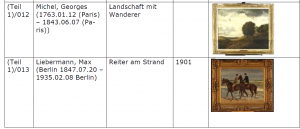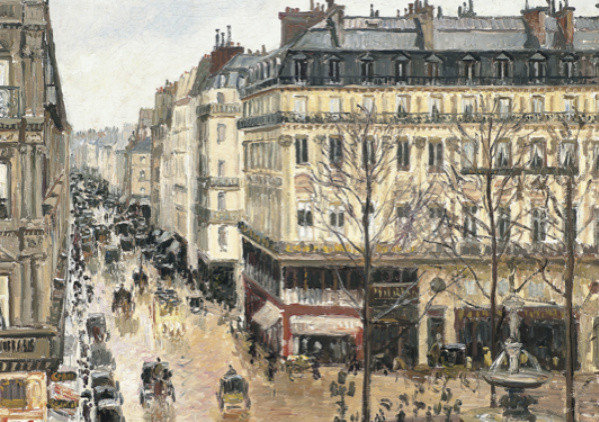Even as we creep up on the anniversary of the theatrical announcement of an agreement between Bavaria, Germany, and the Kunstmuseum Bern concerning the bequest of Cornelius Gurlitt, the court challenge by Gurlitt’s family is by no means over. News came this week that the Munich court overseeing the appeal of the initial denial of the will challenge has requested an expert opinion concerning Gurlitt’s psychological state.
Munich Court Requests Psychological Opinion Concerning Gurlitt’s Competence to Make Will
Topics: Cornelius Gurlitt, Gurlitt Task Force, Nazi-looted art, Gurlitt Collection, Amtsgericht, Oberlandesgericht, Munich, Restitution, World War II, beschlagnahmte Kunst, Kunstmuseum Bern, Raubkunst
Gurlitt Bequest to Kunstmuseum Bern is Upheld, Little Else Resolved
A Munich court ruled last week that the will written by Cornelius Gurlitt in the last days of his life that named the Kunstmuseum Bern (an institution with which he had no relationship whatsoever) was valid, rejecting a challenge by Gurlitt’s cousin Uta Werner. It is emblematic of the strange case of Gurlitt and of German’s bizarre handling of the affair, that this decision resolves very few of the pending issues.
Topics: Conny Leaks, Focus, Carl Spitzweg, Hildebrand Gurlitt, Potemkin Village, Cornelius Gurlitt, Breslau, Henri Hinrichsen, German Minister of Culture, Uta Werner, Gurlitt Task Force, Max Liebermann, Germany, Nazi-looted art, Gurlitt Collection, Seated Woman, Two Riders on the Beach, Entartete Kunst, Salzburg, Gurlitt, NS Raubkunst, Seuddeutsche Zeitung, Restitution, Catrin Lorch, Bavaria, David Toren, World War II, degenerate art, beschlagnahmte Kunst, Austria, Kunstmuseum Bern, Monika Grütters, Martha Hinrichsen, David Friedmann, Henri Matisse, Jörg Häntzschel, Paul Rosenberg
Gurlitt Collection Information Finally On View, Provenance Details Still Needed
As the world adjusts to the announcement last week that the Kunstmuseum Bern has decided to accept Cornelius Gurlitt’s bequest (amid the continuing uncertainty about the validity of the will itself), the most significant development has been the museum’s posting of an inventory of the objects themselves. The museum issued a press release that states:
Topics: Swiss Info, Schwabinger Kunstfund, Hildebrand Gurlitt, Cornelius Gurlitt, Monopol, Nazi-looted art, Gurlitt Collection, Entartete Kunst, Restitution, Bavaria, Der Spiegel, Wall Street Journal, World War II, Degenerate Art Action, degenerate art, beschlagnahmte Kunst, Kunstmuseum Bern, Museums, Münchner Kunstfund
Kunstmuseum Bern Accepts Appointment as Cornelius Gurlitt's Heir, Agreement with Germany
As expected, the press conference today in Berlin held by the Kunstmuseum Bern along with German officials announced that the museum has decided to accept the appointment as Cornelius Gurlitt's heir. As we surmised, the decision was accompanied by an agreement concerning the Nazi-looting suspicions that have followed the one time collection of his father Hildebrand Gurlitt. Hildebrand was one of a select few art dealers authorized during the Nazi regime to sell what the authorities deemed "degenerate art" (see link above for more background).
Topics: Swiss Info, Schwabinger Kunstfund, Hildebrand Gurlitt, Cornelius Gurlitt, Monopol, Nazi-looted art, Gurlitt Collection, Entartete Kunst, Willbald Gurlitt, Restitution, Bavaria, Der Spiegel, Wall Street Journal, World War II, Degenerate Art Action, degenerate art, beschlagnahmte Kunst, Kunstmuseum Bern, Münchner Kunstfund
Gurlitt Relatives Formally Challenge Will that Named Kunstmuseum Bern as Heir
When we wrote yesterday that everything had been said before seeing how the press conference plays out on Monday at which the Kunstmuseum Bern and Germany will make an announcement, it was somewhat tongue in cheek. Today provides an example why: relatives of Cornelius Gurlitt, who would be his heirs at law in the absence of the will that named the Kunstmuseum Bern as his heir, formally announced a challenge to that will today in a Munich court.
Topics: Schwabinger Kunstfund, Hildebrand Gurlitt, Cornelius Gurlitt, Monopol, Uta Werner, Nazi-looted art, Gurlitt Collection, Dietrich Werner, Entartete Kunst, Munich, Willbald Gurlitt, Restitution, Bavaria, World War II, Degenerate Art Action, Helmut Hausner, degenerate art, beschlagnahmte Kunst, Kunstmuseum Bern, Museums, Münchner Kunstfund
Gurlitt and Kunstmuseum Bern Press Conference in Berlin Monday November 24, 2014
The federal government of Germany, the Bavarian Ministry of Culture, and the Kunstmuseum Bern announced today that they will hold a joint press conference on Monday November 24, 2014 concerning the bequest by Cornelius Gurlitt to the Swiss museum when he died. It seems hard to imagine that such an event would announce anything other than acceptance by the museum and perhaps some sort of side agreement with Germany and/or Bavaria.
Topics: Swiss Info, Schwabinger Kunstfund, Hildebrand Gurlitt, Cornelius Gurlitt, Monopol, Nazi-looted art, Gurlitt Collection, Entartete Kunst, Willbald Gurlitt, Restitution, Bavaria, Der Spiegel, Wall Street Journal, World War II, Degenerate Art Action, degenerate art, beschlagnahmte Kunst, Kunstmuseum Bern, Münchner Kunstfund
If the Kunstmuseum Bern Says No: Gurlitt Heirs Discuss Plans if They Inherit Schwabing Trove
As the November 26, 2014 deadline approaches by which the Kunstmuseum Bern must accept or reject the appointment as Cornelius Gurlitt’s heir and the bequest of the paintings seized by the Bavarian government on suspicions of Nazi-looting concerns (as well as those in other countries that were not seized), most observers expect the museum to accept the appointment, albeit perhaps with some side agreement with the German government. But what if the museum says no? Reports floated this week of what Gurlitt’s heirs-at-law might do in that event.
Topics: Schwabinger Kunstfund, Hildebrand Gurlitt, Cornelius Gurlitt, Monopol, SZ, Nazi-looted art, Gurlitt Collection, Entartete Kunst, Willbald Gurlitt, Restitution, Bavaria, World War II, Degenerate Art Action, degenerate art, beschlagnahmte Kunst, Kunstmuseum Bern, Münchner Kunstfund
Glass Half Full or Half Empty? Detailed Report Published on Worldwide Efforts to Restitute Nazi-Looted Art Since the 1998 Washington Conference
After the 1998 Washington Conference on Holocaust Era Assets and the eponymous Washington Conference Principles on Nazi-Stolen Art that came out of it, it is hardly surprising that a recurring theme has been to assess the progress of those nations that participated and signed on. Equally unsurprisingly, those assessments are usually more anecdotal than empirical, and usually arise out of a particular case or cases in the context of that country’s response.
Topics: Graham Bowley, Macedonia, Netherlands, Terezin Declaration, Mussolini, Latvia, Dr. Wesley A. Fisher, Hungary, ICOM, Bulgaria, Commission for the Compensation of Victims of Spol, Germany, Bavarian Minister of Culture, Nazi-looted art, Die Welt, Belarus, Lex Gurlitt, Washington Conference on Holocaust Era Assets, France, Dr. Ruth Weinberger, Romania, Baron Mor Lipot Herzog, Winfried Bausbeck, Belgium, Slovakia, Vichy, World Jewish Restitution Organization, Bundesrat, Washington Conference Principles on Nazi-Stolen Ar, Gurlitt, WJRO, NS Raubkunst, Restitution, International Council of Museums, Norway, United States, Luxembourg, Looted Art, World War II, St. Petersburg, Poland, beschlagnahmte Kunst, Ukraine, Austria, Serbia, Conference on Jewish Material Claims Against Germa, Italy, Bosnia, New York Times, Monika Grütters, Slovenia, Estonia, Museum and Politics Conference, National Gallery, Museum of Fine Arts, entzogogene Kunst, Czech Republic
Limbach Commission Rules Against Claimants to Restitution of “Three Graces” by Lovis Corinth in Unpersuasive Opinion
The German Advisory Commission for the Return of Cultural Property Seized as a Result of Nazi Persecution, Especially Jewish Property (Beratende Kommission) has issued its latest decision concerning allegedly Nazi-looted art in German museums. For the second case in a row after the widely (and wisely) derided opinion not to restitute the Welfenschatz or Guelph Treasure at the Stiftung Preussischer Kulturbesitz in Berlin, the commission (known for its presiding member, former German Supreme Constitutional Court judge Jutta Limbach) has recommended against restitution, this time over the claim by heirs of Clara Levy to The Three Graces (Drei Grazien) by Lovis Corinth (1902/1904). The decision (available only in German) is riddled with poor logic and basic historical errors. In short, while it may be that the painting was indeed delivered to Clara Levy’s daughter in the United States at Clark’s express instruction, that is far less clear than the commission states, and its decision further makes a number of assumptions about the circumstances of Jews in occupied or about-to-be occupied territories that undermine its credibility considerably.
Topics: Berlin, Else Bergmann, Schleifmühle, Hildebrand Gurlitt, Cornelius Gurlitt, Ludwig Levy, Fritz Levy, Rita Hubbard, Germany, Nazi-looted art, bill of lading, Especially Jewish Property, Buchholz Gallery, Madame Soler, German Advisory Commission for the Return of Cultu, San Francisco, Entartete Kunst, Beratende Kommission, Stiftung Preussischer Kulturbesitz, FSIA, Curt Valentin, expropriation exception”, Gurlitt, Restitution, Max Huggler, Mendelssohn-Bartholdy, Clara Levy, Sigfried Rosengart, Luxembourg, Henry Zacharias, Compagnie Generale Transatlantique Hol Lesquette, World War II, Foreign Sovereign Immunities, Pinakothek der Moderne, degenerate art, beschlagnahmte Kunst, Jutta Limbach, Kunstmuseum Bern, Drei Grazien, Pablo Picasso, Lovis Corinth, Museums, Three Graces, Bavarian State Painting Collections, Federal Republic of Germany, Paula Levy, Kurt Buchholz, Welfenschatz, Limbach Commission, New York, Bayerische Staatsgemäldesammlungen
Cassirer Heirs' Claims to Pissarro Work Revived by Appeals Court, the Year 2013 Shows that the Tide for Restitution May be Shifting Again
The U.S. Court of Appeals for the 9th Circuit restored last week claims by heirs of Lilly Cassirer against the Thyssen-Bornemisza Collection for the return of the Camille Pissarro painting Rue St. Honoré, après-midi, êffet de pluie.
Topics: Nuremberg laws, Schwabinger Kunstfund, Cornelius Gurlitt, Lilly Cassirer, California Code of Civil Procedure § 338(c), Dorothy Nelson, Thyssen-Bornemisza Collection, Julius Schoeps, Rue St. Honoré après-midi êffet de pluie, Claude Cassirer, Von Saher v. Norton Simon, de Csepel, Jacques Goudstikker, California Code of Civil Procedure § 354.3, Gurlitt Collection, Foreign Sovereign Immunities Act, Hans Sachs, Von Saher v. Norton Simon Museum of Art at Pasaden, Madame Soler, Bundesgerichtshof, Hildebrand Gurlit, Entartete Kunst, Hans-Heinrich Thyssen-Bornemisza, Hungarian National Gallery, Nazis, Munich, Deutches Historisches Museum, FSIA, Preemption, Gurlitt, Harry Pregerson, Restitution, field preemption, Marei Von Saher, Herzog collection, Bavaria, Claudia Seger-Thomschitz, Looted Art, World War II, Foreign Sovereign Immunities, Pinakothek der Moderne, degenerate art, Altmann v. Republic of Austria, 578 F.3d 1016, Freistaat Bayern, beschlagnahmte Kunst, Camille Pissarro, Kim McLane Wardlaw, Nürnberger Gesetze, Raubkunst, Museum of Fine Arts Boston, Cassirer v. Thyssen-Bornemisza Collection, verschollene Kunst, Kunstfund München





